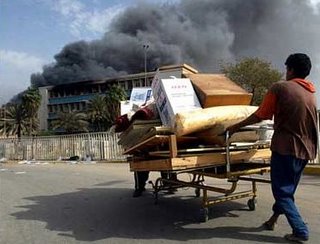 In his weekly radio address, George Bush complained that “those who refuse to give this plan [for
In his weekly radio address, George Bush complained that “those who refuse to give this plan [for The profound flaws of the Bush proposal have already been exposed in minute detail, both in the Congress and around the world. It’s founded in delusional thinking rather than any tenable view of reality. It assumes a level of military and political cooperation from the Iraqi government that would be unprecedented in this long conflict.
Last spring, Senator Joe Biden of
Biden’s proposal attracted a substantial amount of criticism. For one thing, the federal model he proposed is already written into the Iraqi constitution, including a formula for allocating oil revenues on a per capita basis. Critics argued that a formal partition would also result in even greater disruptions caused by the massive relocation of Iraqis from one region to another, raising the specters of Bosnia’s ethnic cleansing (which killed 110,000 people and dislocated 1.8 million) and the partition of India and Pakistan in 1947 (with 14 million dislocated and up to a million killed).
During the eight months since Biden made his proposal, while politicians dithered in
Hundreds of thousands of Iraqis, including many academics and professionals, have voted "no confidence" with their feet by fleeing mixed Sunni-Shi’ite neighborhoods or leaving
The de facto partition of Iraq into Shi'ite, Sunni and Kurdish regions is a harsh reality and the least onerous alternative is to adapt to it and address the humanitarian catastrophe that it's creating. The Iraqi and
The Iraqi military and police, as now constituted, simply can’t or won't perform their assigned duties. Shi’ite members of an Iraqi army unit, for example, are unlikely to follow orders that require them to fight their fellow Shi’ites in the Mahdi army. Sunnis are unlikely to perform aggressively, if they even show up, in offensives against Sunni insurgents in places like Fallujah or Ramadi. Kurd units like the elite Peshmerga (estimated at 100,000 strong) are highly motivated to defend Kurdish autonomy, but they seem to have little or no allegiance to the Shi'ite government in Baghdad.
For now, a majority of Iraqi soldiers and police is far more likely to defend perceived sectarian interests than national interests. Attempts to utilize integrated security forces have usually failed for this reason. Sadly, many or even most Iraqis no longer identify their self-interest with anything like "national" concerns. Nonetheless, the Iraqi regime and the
As the internal flow of refugees makes partition even more of a reality, separate Sunni, Shi’ite and Kurd units, organized like state national guards in the
During a transitional period of three months or so,
The prompt transition to a defensive role is critical for both the U.S. and Iraq. Although sustained urban guerilla warfare neutralizes many of its military advantages in
Military disengagement, beginning with immediate withdrawal of American forces not needed for a defensive role, should be joined with a far more assertive strategy of political and diplomatic consultations. It's abundantly clear that there will be no military solution for any side in this conflict. An overall political strategy would have to include participation by Iran, Syria and Saudi Arabia as well as the contending parties within Iraq.
The central question for Iraqis, meanwhile, is whether Article 1 of their present Constitution has any meaning: “The
In the case of the Sunni Triangle or Shi'ite areas, there’s the additional risk that Al Qaida or another radical group could seize effective control and create a base for terrorist activities elsewhere, on the Afghan model. Either or both regions could become Islamist fundamentalist bases, a risk that the Bush plan fails to address due to its focus on Baghdad. Even a semi-autonomous Kurdish region in the north could provoke Turkish intervention, as threatened many times in the past.
The real choice is between a Bush plan that is doomed from the beginning, since it's a nothing but a regurgitation of failed approaches from the past, and a somewhat less risky approach that could reduce U.S. and Iraqi casualties, quickly end U.S. engagement and give Iraqis a reasonable hope for greater stability. Meanwhile, the partition of Iraq by sectarian cleansing will continue no matter what political choices are made in Washington or Baghdad.
NOTES
*Since the bombing of the Samarra temple last February, an estimated 452,000 internal refugees have registered with the Iraqi government, including 108,00 in December alone, while another 100,000 have been leaving the country each month.
**Iraqi Prime Minister Maliki suggested that U.S. forces lower, rather then raise, their profile when he met with Bush in Jordan on November 30th.
GRAPHIC: Leksikon

1 comment:
I agree that some form of partition may in fact be the best of a very, very poor and shrinking list of options for US strategy in Iraq. (The Bush escalation is a domestic political move and doesn't deserve to be taken seriously as a strategy.)
I'm not sure that there's much point in discussing best-case or least-bad case (or even less-than-worst-case) scenarios here, though. Even if, per impossible, the Bush administration immediately adopted a partition plan and a troop drawdown of the kind you suggest, I'm sure they'd find some way to mess it up worse than we can even imagine.
Post a Comment